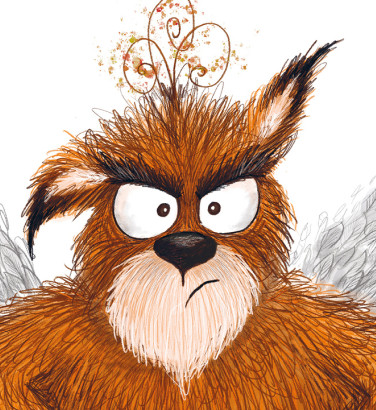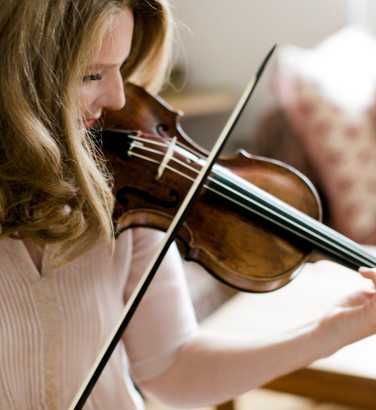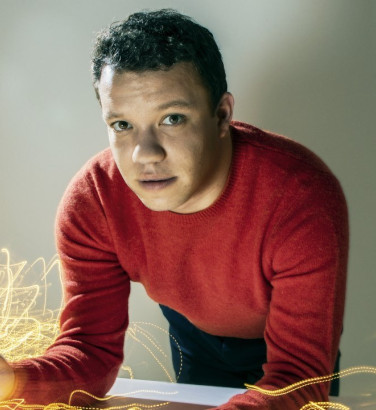
Allan Clayton: "Britten is always specific in his writing"
20 Feb 2023
News Story
To lovers of British vocal music, Allan Clayton hardly needs any introduction. Already long recognised as an exceptional Handel tenor, his star rose further when he sang the title role in the premiere of Brett Dean's Hamlet at Glyndebourne in 2017, and again with an acclaimed run as Peter Grimes in Britten's eponymous opera in Deborah Warner's production for Covent Garden last year.
For all that, he has remained a regular performer with the Scottish Chamber Orchestra, and his interpretation of Britten's Les illuminations in March (with Pekka Kuusisto) promises to be a highlight of the Season. We are delighted he found the time for a short interview.
Welcome back to the SCO, Allan! Are there any past performances with the Orchestra that you look back on particularly fondly?
They’re always very special concerts, but I particularly loved performing at the East Neuk Festival in 2014 - I don’t get to sing Britten in a potato barn very often!
Handel's Jephtha at the 2019 BBC Proms was also a memorable event - there’s something very satisfying about smaller-scale pieces in a venue like the Albert Hall. You can feel the audience being drawn to the stage in a way that doesn’t happen with more bombastic repertoire.
Britten had a remarkable facility for setting texts in other languages. Do you approach Les illuminations any differently from (say) the Serenade for tenor, horn and strings?
Only in that it’s harder to get the French right! Britten is always so specific in his writing (regardless of language), so if you do what he asks 90% of the preparation is taken care of. It’s interesting to sing something like the Michelangelo Sonnets, because Britten didn’t speak Italian and the stresses in the language are often all over the place.
Les illuminations was originally written for soprano. How do you feel this compares to its performance by a tenor?
Obviously the range of the tenor voice means my vocal line sits in a different place in the overall sound. I’ve heard sopranos singing the piece a number of times and there’s something more lively and ethereal than when a tenor sings it. The duets with the solo violin in movements like Antique take on a different quality too - it’s somehow more of a duet, rather than one voice with different strands.
Any tenor singing Britten has to reckon with the long shadow cast by Peter Pears. As a seasoned Britten interpreter, has your appreciation of this changed over the years?
Not especially; I think I was lucky not to be in the generation or so after Pears. I suspect it might have been harder for singers like Robert Tear, Anthony Rolfe Johnson and Philip Langridge who were trying to establish their interpretations of Britten’s tenor roles from the 1970s onwards. It also helps that the British opera scene, and its singers, are more established internationally than they were 80 years ago.
These days, Britten can almost be considered mainstream. Is there any more unusual repertoire you long to be able to explore?
It’s almost mainstream… but it’s frustrating to have to remind some audiences (and opera houses) that a piece like Peter Grimes is 80 years old. I love almost all types of music - I really don’t get on with salsa - and my knowledge of opera is pretty limited so it’s always fun to hear new repertoire. I’ve recently been listening to James Gilchrist and the Linarol Consort’s gorgeous recording of 16th century German love songs, as well as new music from the ever-brilliant Anglo-French composer Josephine Stevenson.

Les illuminations
Who better than Allan Clayton and Pekka Kuusisto to guide us through the weird and wonderful realms of Britten's Les illuminations? Along with music by Haydn and Nico Muhly, there may be some surreal flights of fancy along the way, but in their hands, a safe return home is never in doubt.
Related Stories
![]()
The Great Grumpy Gaboon: a chat with Jay Capperauld and Corrina Campbell
30 December 2024
What is a Gaboon, and why is it grumpy? We chatted to the creators of our new Family Festival to find out ...![]()
Rachel Podger: "I'm especially fond of the Polonaise in the First Brandenburg Concerto"
9 December 2024
The feted British violinist talks to us about her love for the Brandenburg Concertos and more.![]()
Ryan Bancroft: "a conversation with the leader of a Finnish orchestra changed how I heard Sibelius"
30 September 2024
We speak to conductor Ryan Bancroft about music from (his not quite native) Scotland and Scandinavia.


